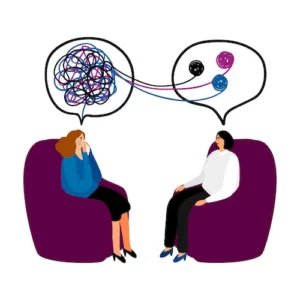If you are struggling with a substance use disorder, you may feel like you are alone. You are not! There is help available, and it comes in the form of psychotherapy. Psychotherapy is a type of therapy that involves talking to a therapist about your thoughts and feelings. This can be an effective way to treat substance use disorders. In this blog post, we will discuss five different types of psychotherapy for substance use disorders.
Contents
What Are Substance Use Disorders?
 Substance use disorders involve a wide range of behaviors related to the use of alcohol, drugs, and other substances. Substance use disorder is an umbrella term for more specific conditions such as:
Substance use disorders involve a wide range of behaviors related to the use of alcohol, drugs, and other substances. Substance use disorder is an umbrella term for more specific conditions such as:
- Alcohol use disorder (AUD)
- Drug abuse
- Addiction
- Polysubstance misuse
It’s important to note that symptoms can vary from person to person, and the severity of a substance use disorder is typically measured on a scale. For example, an individual with mild AUD may only drink alcohol occasionally. While someone with severe AUD may have difficulty functioning in their daily life due to frequent drinking.
So, it will not be easy to determine whether a person is only abusing drugs and alcohol or has an addiction. Therefore, it’s important to seek professional help if you think you or someone you know may be developing a substance use disorder.
Is Psychotherapy For Substance Use Disorders Helpful?
As the condition is not easy to manage and most people lack the knowledge to treat it, psychotherapy has become an increasingly popular form of treatment for substance use disorders. It can provide a safe space for individuals to learn about their condition and work through the challenges associated with it.
Studies have suggested that psychotherapy for substance use disorders can be effective in helping people maintain their sobriety, reduce cravings and improve their overall functioning. It also helps individuals manage the emotions associated with addiction, such as guilt and shame.
The process of psychotherapy for substance use disorders is typically long-term and involves working through underlying issues. Overall, it is really helpful in helping individuals gain a better understanding of their condition and develop strategies for managing it.
What Are The Different Psychotherapy Approaches?
 If you have decided to go on with psychotherapy for substance use disorders. Then, you must be aware of the different approaches to psychotherapy. Here are the top 5 approaches in the list:
If you have decided to go on with psychotherapy for substance use disorders. Then, you must be aware of the different approaches to psychotherapy. Here are the top 5 approaches in the list:
Cognitive-Behavioral Therapy (CBT)
This approach focuses on the relationship between thoughts, feelings, and behaviors to identify how an individual can make positive changes in his or her life. CBT helps individuals develop better-coping skills, and recognize triggers for cravings and addictive behavior. And break negative thought patterns related to substance abuse.
For example, if a person struggles with alcohol addiction, CBT may help them identify negative beliefs about themselves. And then, replacing those thoughts with more positive ones. Also, develop better-coping mechanisms for avoiding relapse.
Motivational Interviewing (MI)
This type of psychotherapy helps individuals to increase their motivation for change by identifying and resolving ambivalence about the change process. It centers around learning how to explore thoughts and feelings related to substance use, allowing for self-reflection and growth. This approach can help motivate individuals to take ownership of their recovery process and stick with it.
Interpersonal Therapy (IPT)
This approach is focused on helping individuals better understand their relationships and how those relationships can lead to substance use or abuse. It helps explore the person’s relationships, identify problems in communication, learn better problem-solving strategies, and build healthier relationships. Through this process, individuals learn how to cope with stress and understand the role of interpersonal issues in substance abuse.
Dialectical Behavior Therapy (DBT)
This approach to psychotherapy is designed to help individuals regulate their emotions and behaviors. It also helps them understand how their actions and reactions can affect others, building emotional regulation skills and better communication with those around them. For instance, individuals with substance use disorders may learn mindfulness strategies to help manage cravings and other triggers.
Acceptance and Commitment Therapy (ACT)
This type of psychotherapy focuses on helping individuals accept their current life situation. While at the same time motivating them to take action in order to move forward in a positive direction. It encourages individuals to set values-based goals and make changes in their behavior to reach those goals. This approach helps individuals become more mindful of their emotions and thoughts.
So they can better respond to cravings in a healthy way. ACT is largely focused on teaching individuals to accept themselves and their situation. While also helping them build resilience, overcome obstacles, and achieve long-term goals.
These are the five most common psychotherapy approaches used for substance use disorders. However, there are other methods that may be applicable. Ultimately, the decision on which approach to use depends on your individual needs and preferences. A licensed therapist can help you determine what is best for you.
What Is The Best Psychotherapy For Substance Abuse?
 When there are several options, it is important to consider which type of psychotherapy is best for a particular individual. While the word best is highly subjective as each individual’s needs are different. But Behavioral therapy is usually the first line of treatment for substance abuse.
When there are several options, it is important to consider which type of psychotherapy is best for a particular individual. While the word best is highly subjective as each individual’s needs are different. But Behavioral therapy is usually the first line of treatment for substance abuse.
The two primary types of behavioral therapy used to treat substance abuse are Cognitive Behavioral Therapy (CBT) and Contingency Management (CM). Both of these therapies are designed to help individuals understand the causes of their addiction. And how to cope with cravings and triggers.
CBT is a type of therapy that focuses on changing negative thought patterns in order to reduce the likelihood of relapse. Contingency Management is more goal-oriented, and rewards individuals for achieving goals. Thus, it is more effective at helping individuals stay motivated and on track.
However, you should keep in mind that there is no one-size-fits-all approach when it comes to treating substance abuse. It’s important to talk to a professional who can help you find the best therapy for your situation.
What Are The Benefits?
Here are some of the most common benefits that you can expect with psychotherapy for substance use disorders:
- Improved relationships: Psychotherapy sessions provide individuals with an opportunity to address underlying issues contributing to addiction as well as identify unhealthy patterns in relationships that may be perpetuating substance use.
- Enhanced communication skills: Through psychotherapy, people learn healthy ways of communicating their needs and feelings both inside and outside of therapy. This improved communication can help individuals avoid situations that might lead to substance use.
- Enhanced self-awareness and understanding: Psychotherapy helps people gain insight into their triggers, feelings, and motivations which can increase overall self-awareness and understanding of their circumstances. This can empower people to make better decisions about their lives.
- Reduced stress and anxiety: The process of psychotherapy helps people identify and work through stressors that may be contributing to their addiction. This can lead to reduced anxiety and a better overall quality of life.
- Improved coping skills: Through therapy, individuals can learn healthy ways to manage difficult thoughts, feelings, and emotions which can help them better cope with life’s challenges and stay away from substances.
- Increased confidence: Psychotherapy can help build a sense of self-worth, which in turn increases an individual’s confidence to tackle substance use problems.
- Improved overall health: People who engage in psychotherapy are more likely to maintain healthier habits such as eating well and getting regular exercise, which can lead to improved overall health.
Ultimately, psychotherapy for substance use disorders can help people find new ways of living and coping with life’s challenges without relying on substances. If you or someone you know is struggling with addiction, consider consulting a qualified mental health professional to discuss how psychotherapy may help.
Conclusion
In conclusion, psychotherapy for substance use disorders may be an effective way to help people manage and reduce their substance use. It can be a beneficial form of treatment for those who struggle with addiction. As it helps them understand the underlying reasons behind their addiction and develop skills to cope with cravings and triggers.
Hence, you should not hesitate to seek help from a professional psychotherapist if you or someone you know is struggling with addiction. Your mental health and well-being should be a priority. And it can be beneficial to receive help from an experienced therapist.
For more information, please contact MantraCare. Abuse is a serious and harmful behavior that can cause physical, emotional, or psychological harm to a person. If you have any queries regarding Online Counseling experienced therapists at MantraCare can help: Book a trial Online therapy session


